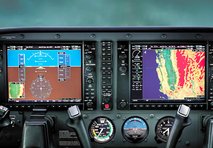March 17, 2018
VFR Rusty Pilot & Emergencies Courses

Aviation Adventures is pleased to announce the 2018 editions of the VFR Rusty Pilot and Emergency Procedures courses, scheduled for March 17, 2018 at the Manassas Regional Airport.
The VFR course will be taught from 8:00 am - 12:00 pm. This course served in large part as the inspiration for the AOPA Rusty Pilots program, which has enjoyed national success!
The Emergency Procedures course will be taught from 1:00 pm - 4:00 pm.
The VFR course is designed for pilots that have been out of the cockpit for a few years, active pilots that would like to get up to speed on new developments in Part 91 flying, and student pilots working towards their Private or Commercial certificates. This is a fantastic opportunity to meet fellow pilots and receive a comprehensive refresher course on various topics that are essential to operating aircraft under Visual Flight Rules in the Washington DC SFRA and beyond. We plan to discuss the following topics:
Pilot Experience, Responsibilities, and Cautions
Airworthiness, Maintenance, and Inspections
Airports, Airspace, and SFRA Procedures
Aviation Weather Products and Flight Planning
Aeronautical Decision Making and Risk Management
The Emergency Procedures course is designed to explore various environmental scenarios and aircraft systems failures that may pose significant operational challenges to pilots. Following the ground session, participants are encouraged to schedule one-on-one time with an Aviation Adventures CFI for some hands-on exploration of the scenarios and failures in the Redbird FMX, and/or the aircraft of their choice. Topics covered include:
. VMC into deteriorating weather: This block of scenario-based instruction begins with a discussion of legal VFR weather minimums for a proposed flight and the pilot's personal minimums, which will inform the go/no-go decision. The objectives are for the pilot to develop an appreciation for marginal weather, and to develop or refine personal weather minimums.
. Engine failures during critical phases of flight: The key objectives for this section of the training program are for the pilot to refine procedures for engine failures during the takeoff roll, after rotation with runway remaining, below 1000' AGL, and above 1000' AGL. After completing this block of instruction, the pilot will have a better understanding of the various factors that need to be considered prior to takeoff that will influence a successful outcome. The pilot will also have a better understanding of how to select a safe altitude from which a return to the airport environment is feasible.
. Aircraft systems and control surface failures: Pilots will focus on diagnosing and working through various systems failures (e.g. alternator, pitot/static system, vacuum system, flaps, brakes, elevator). This block of instruction will begin with a discussion of the systems (normal operations and failures), and a review of the emergency checklists.
. Deteriorated aircraft performance: This block of instruction begins with a discussion of aircraft performance using the Cessna 172 POH to calculate the takeoff roll and distance over a 50' obstacle at various takeoff weights, and temperatures at KBCB (2132' MSL, 4539' x 100') and KLXV (9930 MSL, 6400' x 75'). The instructor will also discuss how density altitude is calculated and its impact on aircraft performance. The objectives are to understand the importance of performance calculations, how to configure a normally aspirated aircraft for high altitude operations and how to safely execute a high altitude/density-altitude takeoff and climb.
The discussion will largely focus on the Cessna 172; however, the principles are broadly applicable to a wide range of single engine piston aircraft.
Each course costs $60, but if you sign up for both, the combined cost will be $100. At the conclusion of the VFR Rusty Pilot course, you will receive a certificate of completion indicating that you have satisfied the ground instruction requirement for the flight review per FAR 61.56. The certificate will be accepted by any Aviation Adventures CFI within six months of the course.
If you would like to attend either or both courses, please register by sending an email to kontanis@gmail.com or by calling the Aviation Adventures Manassas office at 703-530-7737 with your name, email address, and a preferred phone number. Also, please specify if you would like to register for one or both courses. This will help us plan for course materials.
Space is limited to approximately 40 participants for each course, so please reserve your position soon!






 Having used at least eight flight schools in six countries Aviation Adventures stands out for the professionalism of its instructors, the quality of its equipment and...
Having used at least eight flight schools in six countries Aviation Adventures stands out for the professionalism of its instructors, the quality of its equipment and...